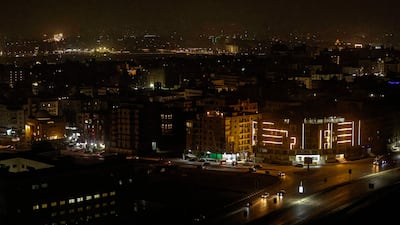For the first time in nearly a decade, Egyptians are experiencing a hardship that many thought had disappeared and would never come back: power cuts.
Given the government often boasts of being ready to export surplus electricity, the power cuts have shocked and angered Egyptians, adding another layer to their daily struggle to make ends meet in a crushing economic crisis.
The nation of 105 million has been gripped by a heatwave of 40°C and higher for days.
Sensing the growing discontent, government ministers and senior officials from the Electricity Ministry have made regular appearances on TV talk shows to assure the public the problem will soon be resolved.
With electricity consumption hitting record levels, they explained, there was not enough natural gas available to feed the cutting-edge power stations built over the past decade.

Officials did not elaborate on what had caused the shortage of natural gas. That ambiguity, in turn, has given rise to speculation that no contingency plans were in place to meet surging demand for electricity during a heatwave of the magnitude currently seen.
On Monday, the government denied reports that Egypt's giant Zohr gasfield in the Eastern Mediterranean was facing technical problems.
Work is under way on the field's 20th well, after which Zohr, discovered in 2015, was expected to produce 2.3 billion cubic feet per day, an official statement said.
Also on Monday, the government said the ministers of oil and electricity held an “emergency” meeting to “lay down drastic and quick solutions to end the crisis of power cuts arising from a fuel shortage”.
Authorities have meanwhile urged Egyptians to try to conserve power, with Electricity Minister Mohammed Shaker, speaking on live TV, advising citizens to “turn off the lights when you leave the room”.
The power cuts are not long, tending to last an hour or two every day, but the absence of advance warnings and the heatwave are causing problems for many.

“I understand that on days like these, they may have to do this, but why not tell us when so we are ready?” said a 69-year-old retiree from Cairo. “I had two [power cuts] yesterday, one in the morning and one in the evening. Each lasted an hour but in this heat it felt so much longer."
A statement by the holding electricity company this week said power cuts should routinely be expected within a 20-minute period starting at 10 minutes before the hour. It gave no other details, saying only that using lifts during those windows should be avoided.
The statement had talk show hosts scratching their heads trying to explain it to viewers, with one, the widely followed Lamis El Hadidy, dismissing the statement as “ridiculous”.
Egypt's electricity surge
Power cuts in Egypt have been rare since President Abdel Fattah El Sisi poured billions of dollars into the construction of new power stations and on upgrading and expanding the distribution network.
The investment paid off handsomely.
Egypt has a power-generating capacity now that stands at 48,000 megawatts, with local consumption estimated at a maximum of 36,000MW, leaving it with a surplus of 12,000MW.
Consumption over the past week surged to 34,650MW as most Egyptians switched on their fans and air conditioners to cool off during some of the hottest days of the summer.
Politically, the overhaul of the power sector in the past few years has set the 68-year-old Egyptian leader apart from his predecessors, whose years in power over the seven decades since the overthrow of the monarchy have been defined in part by power cuts caused by negligence and lack of investment.
However, the timing of the blackouts may have been unfortunate for Egypt's leader of nine years.
Mr El Sisi faces an election late this year or early in 2024 with his multibillion-dollar overhaul of the economy and infrastructure a key part of his narrative as a leader deserving another six-year term in office.
With the economy in a woeful state, the President could have done without increasing discontent over the power cuts and the authorities' clumsy handling of the problem.
It is not that Mr El Sisi would lose the election over the issue – he has not yet said whether he will seek re-election. Furthermore, he is virtually certain to run and comfortably win – but opponents have used the blackouts as a basis to renew their criticism of his handling of the economy.


